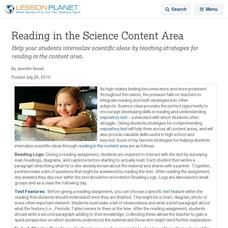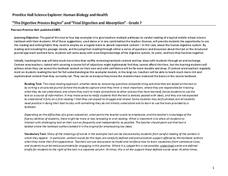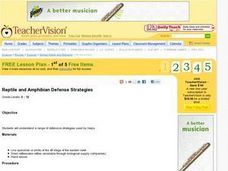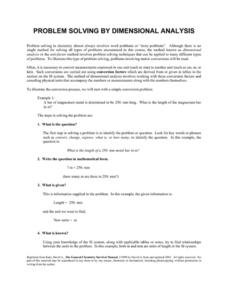Conneticut Department of Education
Instructional Strategies That Facilitate Learning Across Content Areas
Imagine 28 instructional strategies, appropriate for all subject areas and all grade levels. Directed Reading-Thinking Activities (DRTA), Question-Answer Relationship (QAR) activities, KWL charts, comparison matrixes, classification...
Core Knowledge Foundation
Cycles in Nature Tell It Again!™ Read-Aloud Anthology
A read-aloud anthology offers stories all about nature's life cycles. Over three weeks, second graders listen to and discuss tales about the cycles of daytime, nighttime, seasons, plants, trees, frogs, butterflies, and water. Following...
Curated OER
Let's Get it Together! Reading to Learn
Let’s learn about frogs! Young readers are led through “Freaky Frogs,” a non-fiction article. Teach learners how to edit an article so there are fewer details to sift through. After talking through the article, they learn the six steps...
Curated OER
Reading Comprehension Worksheet: Compounds & Elements
In this reading comprehension worksheet, students read several short paragraphs about compounds and elements and then answer several questions about the text.
Curated OER
Unit 1: Water is Life: The Heart and Science Behind this Phrase
Water, water, everywhere — but will there be enough to drink? Check out these detailed lesson plans to meet NGSS water cycle and CCSS literacy standards in your science classroom. Learners do a close reading of a challenging, poetic text...
Curated OER
Reading in the Science Content Area
Help your students internalize scientific ideas by teaching strategies for reading in the content area.
Curated OER
Night of the Twister
Young scholars use reading strategies for Night of the Twister. In this reading strategies instructional activity, students name five major catastrophes and books about each. Young scholars complete a vocabulary section, make inferences...
Curated OER
Stellaluna
First graders discuss the strategy of asking yourself questions while reading. in this Stellaluna lesson, 1st graders write questions on a chart about the story. Students turn and talk after reading chunks of text. Students see which...
Lerner Publishing
Meet the Dinosaurs
Take your class of youngsters on a prehistoric adventure with this four-lesson series on dinosaurs. Accompanying the Meet the Dinosaurs books by Don Lessem, these lessons engage children in writing their own dinosaur books,...
Lee & Low Books
First Come the Zebra Teacher’s Guide
Accompany a reading of First Come the Zebra written and illustrated by Lynne Barasch with a teacher's guide equipped with before reading, vocabulary, and after reading activities. Additional social studies,...
Savvas Learning
"The Digestive Process Begins" and "Final Digestion and Absorption"
Want your class to digest text more thoroughly? Middle schoolers learn about the digestive system in the lesson and reinforce informational text reading skills through a variety of strategies. They engage in a close reading...
Curated OER
Reading Comprehension: History of the Periodic Table
Although the article that launches this lesson is about the history of the Periodic Table, the objective is reading comprehension. Using the eight-page informational text, learners answer five comprehension questions and craft one essay....
WE Charity
High School–Module 2: Circular Economy and Nature
Everyone's heard the popular slogan reduce, reuse, recycle, but there may be a better way to talk about sustainability. Using the second lesson plan from the five-part WE Are Innovators—High School Modules series, learners explore issues...
Curated OER
Reptile and Amphibian Defense Strategies
Students study the stages of the Eastern newt either by collecting a live specimen or from pictures. They note the colors of the eft stage before reading the "Eastern Newt Species Account" that shows the newt's life stages, migration,...
Curated OER
Teaching Science to English Language Learners
Use these hands on lesson plans to make science more accessible for English Language Learners in your classroom.
Chymist
Problem Solving by Dimensional Analysis
Is your class in another dimension with regards to dimensional analysis? Give them some extra practice with a straightforward activity. Learners convert units by following concise step-wise examples, including setting up the...
Curated OER
Dinosaurs---Read All About Them!
Students read all about dinosaurs. In this biology lesson plan, students examine how to use library research as integral part of scientific research.
Consortium for Ocean Science Exploration and Engagement (COSEE)
Understanding the Food Web
Building on prior knowledge of the pervious lesson plan in the series, pupils explain the previous lesson plan to each other. Then they write a simple guide for a young child to read on the same topic.
Curated OER
Planting Rabbit King’s Carrot
Even pirates know not to steal stuff you can make yourself! Read The Pirate's Parrot Stole the King's Carrot to engage your class. Then, plant carrots with your class. If this isn't possible with your kiddos, consider cutting out paper...
Curated OER
Improving Deductive Reasoning Skills
Students develop a strategy list for problem solving by working with different types of problems. They recognize problems that may be solved using deductive reasoning and solve deductive reasoning problems.
Intel
Forensics: Get a Clue
Although the methods are all scientific, forensic science was started by police officers rather than scientists, who relied on observation and common sense. Young detectives use many tools to solve crimes around the school in a...
Lerner Publishing
Teaching Habitats
What makes up a habitat? Use this resource to engage first graders in the exploration of desert, wetland, forest, and ocean habitats. Youngsters classify plants and animals into the four distinct habitats through drawings and cutting and...
American Museum of Natural History
What's This? Reproduction
Attracting the right mate is as important for humans as any other species. An interesting lesson teaches individuals about several strategies that animals and plants have adapted to attract their mates. From colorful nests to powerful...
K20 LEARN
No Imitations, Please! Avoiding Plagiarism
With all the stuff available online, good essays are just a click away. But talk about tracking! Writers beware! New tech can now identify plagiarism, and the consequences of presenting someone else's work as your own are severe. Here's...























